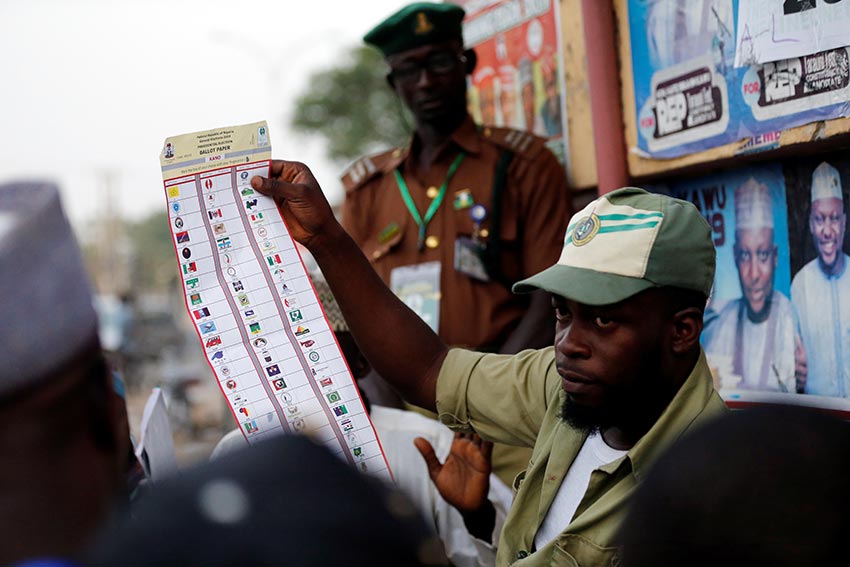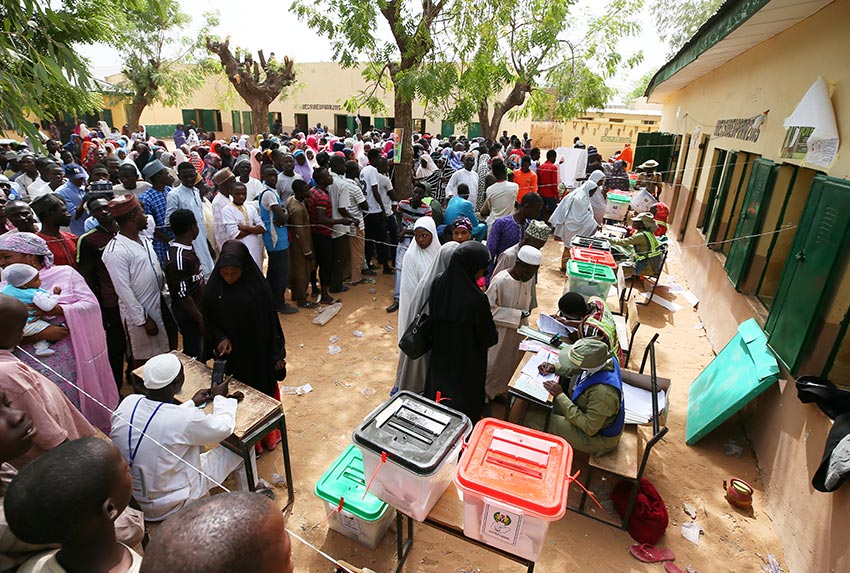It’s been one year since the 2019 general election in Nigeria and the courts are still busy deciding who the winners were in dozens of districts. When one looks at the rate at which the courts, and not the electorate, actually end up deciding the winners of the polls in the country, one must agree that the very credibility of Nigeria’s elections is at stake. Ini Dele-Adedeji argues that the situation has got so out of hand that the electoral system may not support a democratic future in Nigeria.
One of the most recent Nigerian election cases was in Bayelsa State. The candidate of the All Progressives Congress (APC) was initially thought to have won the election. But he was sacked by the Supreme Court 24 hours before his swearing-in ceremony because, the court found, his running mate had presented fake documents and was therefore disqualified. You can’t be a candidate without a qualified running mate.
There is also a case in Imo State. There, the candidate of the People’s Democratic Party (PDP) was sworn into office like others on May 29, 2019. But he was removed by the Supreme Court following a dispute over the electoral result. In its ruling, the court declared the candidate of the All Progressives Congress the winner. He had come fourth at the polls.
The power to determine who is elected into political office ought to be decided by voters. Judicial recourse is perfectly allowed and is preferable to extra-judicial measures to redress perceived electoral slights. But this should be an exceptional option taken to rectify an electoral impropriety of some sort.
But it is not the exception in Nigeria. The Independent National Electoral Commission (INEC) recently announced that it had so far withdrawn 64 certificates of return – documents issued to election winners – and reissued them to people declared winners by courts of law following the 2019 general elections. The election saw 1,031 candidates contesting for presidential, governorship, national assembly and state houses of assembly seats.

The reality is that there is merit to a large majority of the cases brought before the law courts seeking electoral redress. This is because electoral malpractice has become part of Nigeria’s electoral culture. These malpractices take place before, during and after elections. Some of the most common examples include multiple thumb-printing, falsification of result sheets, fake ballot papers, manipulation of voter registration and the use of violence to disrupt voting.
Weaknesses in the system
Nigeria has a strong Electoral Act. It has been amended a few times over the years and it is not different from the electoral constitutions being used in other democratic climes.
But the law can only go so far. The bigger problem is an absence of strong democratic institutions to support it. The strengthening of democratic institutions, I would argue, would result in an increase in free and fair elections.
In particular the electoral commission and the police force need to be strengthened. The police are usually left out during elections. Instead of being trained and given the wherewithal to assist electoral commission officials in safeguarding voters, electoral officials and ballot centers, the army is usually deployed during elections. This puts the police and army at cross purposes. It also increases the possibility of violence ensuing.
Another problem is the Independent National Electoral Commission. The root of a lot of the election-related cases brought before the courts can be traced to its limited ability to anticipate and address known recurring election-related problems. Examples include its inability to secure ballot boxes and tally votes in a timely fashion.
These things could be achieved if the commission was strengthened by the executive and given the statutory, logistical, financial support, and independence it requires.
Who benefits?
Politicians – and those close to them – are the only ones to benefit from the current state of affairs. The Nigerian voting public will always come off worse. This is because voters are likely to become apathetic about voting if they feel that their vote doesn’t matter in the grand scheme of things. Low voter turnout is an indictment of the electoral process.

In addition, the argument over whether the courts are partial or impartial is a moot one. The fact remains that appointments to positions in almost every aspect of Nigeria’s public sector are politically influenced. Nigerians are, therefore, right to question the partiality – or otherwise – of the courts.
The current trend also has the potential to embolden politicians to forego the polls and instead try to “win” elections by influencing the judiciary in underhand ways.
Making a habit of bypassing elections as a means of determining elected officials due to electoral irregularities, and forcing the judiciary to constantly have to annul elections doesn’t bode well for Nigeria’s fledgling democracy – that puts it in jeopardy.